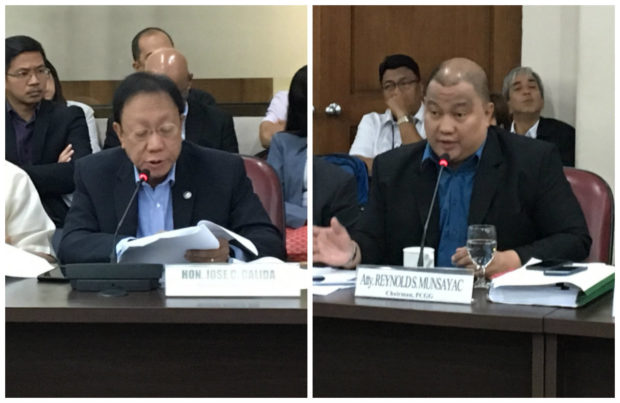
Solicitor-General Jose Calida (left) and PCGG Chairman Reynold Munsayac (right) during the House of Representatives’ justice subcommittee hearing on October 3, 2017. Philippine Daily Inquirer / Vince F. Nonato
The proposal to absorb the Presidential Commission on Good Government (PCGG) into the Office of the Solicitor General (OSG) has moved one step closer at the House of Representatives.
This, because the House justice subcommittee on judicial reforms approved on Tuesday the substitute bill consolidating six measures that seek to strengthen the OSG and let the OSG take over the functions of the PCGG and the Office of the Government Corporate Counsel (OGCC).
The substitute bill will have to be approved by the mother committee of justice before it is sent to the House plenary.
The proposed measure will transfer the PCGG’s functions to a “special task force” within the OSG composed of at least five of the its 50 legal divisions. Each division is composed of at least 10 lawyers headed by an assistant solicitor general.
This major change to earlier proposals was spearheaded by Bayan Muna Rep. Carlos Isagani Zarate to ensure that PCGG’s mandate of going after stolen public funds and ill-gotten wealth amassed during the Marcos dictatorship would be retained.
The proposed OSG special task force will be mandated to file and prosecute PCGG cases, continue handling cases for the recovery of ill-gotten wealth and behest loans, grant immunity to state witnesses, and call upon any government agency for assistance.
Pending the court rulings on the forfeiture cases, the task force “shall be responsible for preserving and maintaining such assets.”
During Tuesday’s subcommittee hearing, Zarate said this amendment would “address the concern that the mandate of [PCGG under] Executive Order No. 1 would be let go.”
However, Zarate expressed concern that it would only be an ad hoc task force that “can be dissolved depending on the assessment of the Solicitor-General whether there’s a need for the task force.”
But Solicitor General Jose Calida assured that “this is not an ad hoc” body.
Meanwhile, PCGG Commissioner John Agbayani said during the hearing that he found it “not appropriate to abolish an existing agency which is very efficient.”
Arguing that agencies are only streamlined when inefficiencies arise, Agbayani asserted that, “In our case, it is neither inefficient nor redundant… If it is not broken, we should not fix it.”
Leyte 3rd Dist. Rep. Vicente Veloso, a former Court of Appeals justice, said the agency had been in existence since 1986 after the Marcos regime was toppled. Yet, forfeiture cases involving P102 billion in assets remain pending.
“(The) P102 billion (case is still pending), my God! After how many years is that? Until now, it’s still pending,” Veloso said.
PCGG chair Reynold Munsayac, however, responded that the Sandiganbayan can take too long—14 or even 17 years in some cases—to resolve motions to dismiss.
“Sometimes, it’s not just the fault of the PCGG, it’s the fault of the judicial system,” he said. “This does not involve trivial cases. Our opponents, they have all the best resources to get the best lawyers.”
Veloso replied that for cases to stay still for that long, the PCGG, represented by the OSG, must have not done anything.
This situation, Veloso said, even more justifies the move to let OSG absorb the PCGG.
“Two in one house, they will complement each other. We are all judged on efficiency and inefficiency,” he added.
The substitute bill was crafted out of House Bill Nos. 350, 547, 3275, 4748, 5216 and 5233, filed by Deputy Speaker Romero ‘Miro’ Quimbo, Representatives Evelina Escudero, Harry Roque Jr., Gary Alejano and Joaquin Chipeco Jr., and Speaker Pantaleon ‘Bebot’ Alvarez. /kga